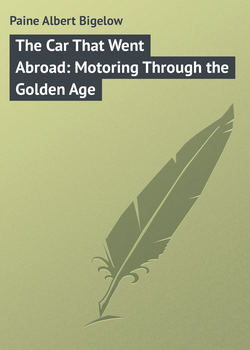Читать книгу The Car That Went Abroad: Motoring Through the Golden Age - Paine Albert Bigelow - Страница 7
Part I
THE CAR THAT WENT ABROAD
Chapter VI
THE WAY THROUGH EDEN
ОглавлениеThere is so much to see at Arles. One would like to linger a week, then a month, then very likely he would not care to go at all. The past would get hold of him by that time – the glamour that hangs about the dead centuries.
There had been rain in the night when we left Arles, much needed, for it was the season of drought. It was mid-morning and the roads were hard and perfect, and led us along sparkling waysides and between refreshed vineyards, and gardens, and olive groves. It seemed a good deal like traveling through Eden, and I don't suppose heaven – the automobilist's heaven (assuming that there is one) – is much better.
I wish I could do justice to the Midi, but even Mistral could not do that. It is the most fruitful, luscious land one can imagine. Everything there seems good to eat, to smell of – to devour in some way. The vines were loaded with purple and topaz grapes, and I was dying to steal some, though for a few francs we had bought a basket of clusters, with other luncheon supplies, in Arles. It finally became necessary to stop and eat these things – those grape fields were too tempting.
It is my opinion that nothing in the world is more enjoyable than an automobile roadside luncheon. One does not need to lug a heavy basket mile after mile until a suitable place is found, and compromise at last because the flesh rebels. With a car, a mile, two miles, five miles, are matters of a few minutes. You run along leisurely until you reach the brook, the shade, the seclusion that invites you. Then you are fresh and cool and deliberate. No need to hurry because of the long tug home again. You enjoy the things you have brought, unfretted by fatigue, undismayed by the prospect ahead. You are in no hurry to go. You linger and smoke and laze a little and discuss the environment – the fields, the growing things, the people through whose lands and lives you are cutting a cross-section, as it seems. You wonder about their customs, their diversions, what they do in winter, how it is in their homes. You speculate on their history, on what the land was like in its primeval period before there were any fields and homes – civilized homes – there at all. Perhaps – though this is unlikely – you know a little about these things. It is no advantage; your speculations are just as valuable and more picturesque. There are many pleasant things about motor gypsying, but our party, at least, agreed that the wayside luncheon is the pleasantest of all.
Furthermore, it is economical. Unless one wants hot dishes, you can get more things, and more delicious things, in the village shops or along the way than you can find at the wayside hotel or restaurant, and for half the amount. Our luncheon that day – we ate it between Arles and Tarascon – consisted of tinned chicken, fresh bread with sweet butter, Roquefort cheese, ripe grapes, and some French cakes – plenty, and all of the best, at a cost of about sixty cents for our party of four. And when we were finally ready to go, and had cleaned up and secreted every particle of paper or other refuse (for the true motorist never leaves a place unsightly) we felt quite as pleased with ourselves and the world, and the things of the infinite, as if we had paid two or three times as much for a meal within four walls.
